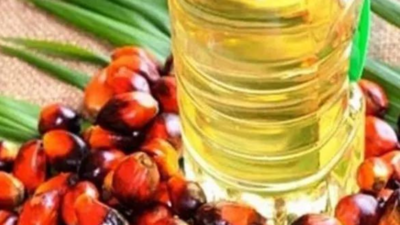NEW DELHI: Industry associations Solvent Extractors’ Association (SEA) and Indian Vegetable Oil Producers’ Association (IVPA) have welcomed the government’s decision to reduce the basic customs duty on crude edible oils to 10 per cent, calling it a timely intervention that supports domestic refiners and discourages imports of finished products.Announced on Friday, the policy reduces the basic customs duty on crude palm, soybean, and sunflower oils from 20 per cent to 10 per cent. The effective import duty now stands at 16.5 per cent, down from 27.5 per cent. In contrast, refined edible oils continue to attract a 32.5 per cent basic duty, with an effective duty of 35.75 per cent.The move follows concerns raised by the industry over rising imports of refined palmolien. Over the past six months, SEA and IVPA had urged the government to widen the duty gap between crude and refined edible oils to protect local refiners.“The government’s decision to increase the duty differential from 8.25 per cent to 19.25 per cent is a bold and timely move. It will discourage imports of refined palmolien and shift demand back to crude palm oil, thereby revitalizing the domestic refining sector,” said SEA President Sanjeev Asthana.He added that while overall edible oil import volumes may remain unchanged, domestic prices are likely to fall, benefitting consumers.India, which imports over 50 per cent of its edible oil requirements, brought in 159.6 lakh tonnes worth Rs 1.32 lakh crore during the 2023–24 oil marketing year. Key sourcing countries include Malaysia and Indonesia for palm oil, and Brazil and Argentina for soybean oil.IVPA President Sudhakar Desai expressed appreciation for the government’s acceptance of their recommendation to expand the duty gap, calling the step a boost for domestic manufacturing.SEA Executive Director B V Mehta described the revised duty structure as “a win-win situation for vegetable oil refiners and consumers, as local prices will go down due to lower duty on crude oils.”Previously, the narrow 8.25 per cent duty gap between crude palm oil (CPO) and refined palmolien had incentivised finished product imports. Refined palmolien accounted for over 20 per cent of total palm oil imports in 2023–24, rising to nearly 27 per cent in the first half of 2024–25.On May 29, the cost-and-freight (C&F) price of refined, bleached, and deodorised (RBD) palmolien was USD 45 per tonne lower than that of crude palm oil, further skewing trade in favour of refined imports.
Trending
- China tightens supply: India’s auto industry seeks govt help on rare earth magnet imports; key EV parts impacted
- Mohandas Pai flags lack of domestic capital for Indian startups; urges policy overhaul; calls for stronger R&D support
- Trump-Musk rift rattles Wall Street; Tesla share slide exposes market fragility; major indexes take a hit
- Real estate market: Major listed firms sell over Rs 1 lakh crore properties; Godrej leads
- Delhi infrastructure project: Centre approves Rs 24,000-crore plan to decongest Delhi; Tunnel to link Mahipalpur to Vasant Kunj
- Tata Steel new plant: $1.5-billion electric arc furnace facility to come up at Port Talbot; UK government gives 500 million pounds
- RBI repo cut effect: HDFC slashes lending rates by 10 bps; new rates already in effect
- Jamie Dimon-led JPMorgan issues stern warning! Job hopping analysts to be fired; ‘if you accept a position with..’
- Myntra goes global: Online retailer launches first international platform in Singapore; targets Indian diaspora
- Market valuation: Mcap of 9 of 10 most valued firms jumps Rs 1 lakh crore; Reliance leads the way

